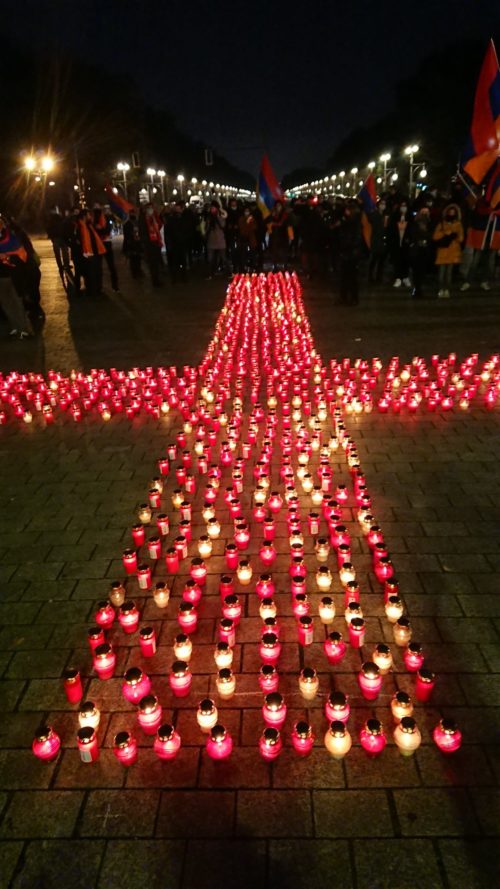
Peace for Artsakh
Orchestra for Peace Performs in Berlin
by Muriel Mirak-Weissbach
BERLIN, NOVEMBER 12, 2020 — Walking up towards the Brandenburg Gate, you see on the ground a myriad of small red votive candles, lined up in rows to form a huge cross. Behind it, on a stage, an orchestra plays a piece by Komitas. It is November 6 in Berlin, and people have been gathering throughout the afternoon, to take part in an event dedicated to peace in Berg Karabakh. They have been visiting information stands to find out about the conflict, have seen works on exhibit by Berlin artist Mischa Badasyan and have listened to speakers from the political and cultural world address the issue.
Following the speeches, each person received a votive candle, proceeded to place it on the ground. First the bare outline of the cross came into being, then candle after candle was added, until the enormous cross-filled and dominated the broad space in front of the majestic Brandenburg Gate.
It was not an event by Armenians for Armenians, as Shushan Ghazaryan chairwoman of the German-Armenian Student Club HAIK explained, but an informative gathering, where people could learn about the conflict. The students were not organizing a demonstration or a protest action, but a cultural event dedicated to peace.
Serim Dagdelen, a member of the Bundestag (Parliament) from the Left Party, said they had gathered at the Brandenburg Gate “out of concern for the people in Berg Karabakh, out of concern for peace in the South Caucasus. We want an end to the bombings, an end to the expulsions, we want peace in Berg Karabakh.“ Dagdelen said reports were arriving almost by the hour, of severe bombings by the Azerbaijan army; “again civilians are being killed and wounded, again homes are being burned; a human catastrophe is looming in the region,” she warned.

The cross of votive candles
Referring back to the resolution passed in the Bundestag on June 2, 2016, which recognized the Armenian genocide, she said it had not been easy to organize the votes. But “now, four years later, when people in Berg Karabakh are being attacked by Azerbaijan, and by Islamist killers,” when Turkish drones and Erdogan’s advisors are involved, “the Bundestag must not remain silent. We have a responsibility and we must live up to it.”
Martin Kranz, a leading figure in cultural activities in Weimar, spoke of genocide happening now — “a genocide towards one nation.” This is something that can be neither accepted nor ignored: “we as part of German society, must raise our voices, and reject this.” He said he had come to “tell Armenians that we are definitely on your side.”
For Leo Ensel, a conflict researcher specialized in the post-Soviet space; it is above all a moral issue. “People who are alone and rely only on themselves, a country which receives almost no outside support and which has been traumatized by the genocide 105 years ago, must never be left on its own, isolated.” In addition to this moral obligation, one must consider the fact that Europe may be suffering under the illusion that this conflict is far away, and has nothing to do with it – far from the truth.
The event closed with concert performed by the “Orchestra for Peace,” directed by Alexandr Iradyan. Pianist, composer and conductor, Iradyan graduated from Yerevan State Conservatory, then continued his studies at Brussels Royal Conservatory, before coming to Berlin, where he received his Masters at the University of Arts. The concert featured classical works by Komitas, Marzoyan and Altunyan.
Featured performer was soprano Hrachuhi Bassénz, ensemble member of the Dresden Semperoper. Bassenz also delivered a moving address. “We don’t want anything from others,“ she said, “and have never taken anything away from others. But a lot has been taken from us.” She pointed to the losses sustained by Armenians in history. “From a very extensive territory of Armenia, a very small piece is left,” she said, “What else do they want? As an old and very creative nation, we have always created something new and passed it along. Is humanity going to ignore this? We are the soldiers of peace,“ she said, “We have the right to defend ourselves and we are doing it.”